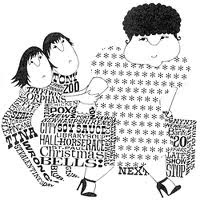So are there any?
First, there's one of the recurring threads: "There is no place where one cannot plant ivy over the mud hut and put a flower on the stump....I am sure that there is no place in the world where your message would not be enhanced by your making the place (whether tiny or large, a hut or a place) orderly, artistic and beautiful with some form of creativity, some form of 'art.'"
And then the idea that "we [ourselves] are an environment for the other people with whom we work, the people with whom we communicate. And in this sense we do not choose an art form and create something in that form; we are an art form...an art form God can use in this area of environment."
As others have pointed out, Edith always comes back to communication, a message.
Is the message we are living clear, or is it a lot of "glub-blubs?"
Are we hiding our real identities and gifts? Leaving clues on bits of paper towel, or doing something more?
"We should be artists in...doing something practical to show that expectancy [that God can intervene]...affects the attitudes other people are going to have to their troubles."
Mr. Banks carved the turkey; the plates were passed and filled high to overflowing; and Mrs. Carillon asked Augie Kunkel to say grace.Linked from the Hidden Art of Homemaking linky for Chapter 14 at Ordo Amoris.
Augie Kunkel didn't know how to say grace. He just named the dishes and let the delicious smells inspire the proper reverence:
Patate douce, dindonneau truffée, airelles en couronne, petits oignons, pointes d'asperges au beurre, purée de marrons.
"Amen," said Mr. Banks, who didn't understand French; and the eating and the chatting and the celebrating began. ~~ Ellen Raskin, The Mysterious Disappearance of Leon (I mean Noel)




6 comments:
Even though I thought Mrs Schaeffer used the word *should* alot in this chapter, I was not offended. Maybe she was *moralizing*??
I was convicted about what vibes I may give off and how I might keep them in check.
Your post was entertaining.
I did not send you a private email. So, I hope nothing has been hacked :-(
OK, just checking! Probably just spam.
Love the Ellen Raskin references! I felt differently, a bit, about this chapter--that it did, indeed, tie up things nicely. Isn't it interesting how we all take different things away from it?
This last chapter did seem a bit short and clipped off to me, at first. And then I found I had gleaned quite a lot from it. Chapters 13 & 14 really are meatier chapters, and rather than force-feed us, maybe Mrs. Schaeffer is allowing us to ruminate a bit, to come to our own conclusions. It's been a great study!
I agree that it was a quick ending. And I think I commented on this post already but it didn't make it. Sometimes I forget to follow ALL the steps to posting on blogs.
I only own Raskin's The Westing Game but maybe I should try the others.
Post a Comment